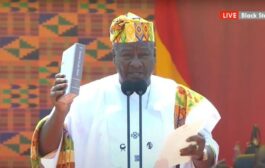The International Perspective for Policy and Governance (IPPG) has issued a policy brief urging President John Dramani Mahama and the National Democratic Congress (NDC) to reconsider their proposed scrapping of the emissions levy.
While the move to eliminate certain taxes aims to alleviate economic pressure on citizens, IPPG emphasizes that retaining the levy and directing its revenues toward climate finance could strengthen the NDC’s commitments to combating climate change, fostering green growth, and advancing renewable energy initiatives outlined in its manifesto.
Why the Emissions Levy Matters
Introduced in December 2023 through the Emissions Levy Act, 2023 (Act 1112), the levy imposes charges on carbon dioxide equivalent (CO2e) emissions from sectors such as construction, manufacturing, mining, energy, and internal combustion engine (ICE) vehicles.
According to Mr. Seth Owusu-Mante, Research Fellow at IPPG and co-author of the brief, the levy was designed to fund climate adaptation and mitigation efforts. However, the absence of a transparent mechanism for allocating revenue under the New Patriotic Party (NPP) administration has undermined its transformative potential.
Climate change poses significant threats to Ghana, impacting sectors such as agriculture, water resources, health, and infrastructure. Vulnerable groups, including rural and marginalized communities, are disproportionately affected.
IPPG asserts that repurposing the emissions levy into a dedicated climate fund would establish a reliable, locally-driven financing mechanism to implement cross-sectoral climate resilience initiatives, reducing reliance on external aid.
Recommendations for Strategic Use of the Levy
- Cross-Sectoral Climate Resilience Initiatives
The proposed climate fund could support projects such as climate-smart agriculture, advanced irrigation systems, flood-resistant infrastructure, and public health initiatives to address climate-related diseases. These efforts align with the NDC’s manifesto commitments to reduce vulnerabilities and enhance resilience across economic sectors. - Incentivizing Green Practices under the 24-Hour Economy Policy
IPPG recommends using the fund to encourage businesses to adopt environmentally responsible practices through tax rebates, grants, and subsidies. Citizens could also benefit from incentives to transition to electric vehicles, solar panels, and energy-efficient appliances. This approach would drive sustainable investments and align with the NDC’s vision for a 24-hour economy. - Scaling Renewable Energy Projects
The climate fund could be instrumental in expanding renewable energy initiatives such as solar and wind farms, waste-to-energy systems, and off-grid solutions. By addressing challenges in gas supply and energy costs, these investments would enhance electricity access, reduce emissions, and support Ghana’s transition to a sustainable energy mix.
Building Trust and Ensuring Transparency
For these recommendations to be effective, IPPG calls for robust governance and transparent allocation mechanisms for the climate fund. Engaging stakeholders through consultations and clearly communicating the benefits of the emissions levy would be essential to gaining public trust. Strengthening emissions verification systems and aligning revenue allocation with specific climate objectives would ensure accountability and drive impactful results.
IPPG’s proposal highlights a strategic path for the NDC to balance economic considerations with its climate ambitions. Retaining and repurposing the emissions levy could position Ghana as a leader in sustainable development while safeguarding vulnerable communities from the worsening effects of climate change.
Source:Mybrytfmonline.com/Gumedzo Isaac Acheampong



















































